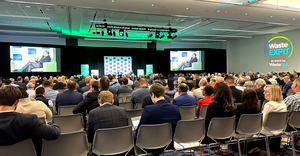RECYCLING: Workshop Offers Steps To Combat Recycling Barriers
January 1, 1994
Michelle Roberts
In California, statewide legislation has made recycling an everyday habit. As a result, the amount of recyclable materials collected each year exceeds the demand for their use in manufacturing.
To address the problem, the Community Environmental Council (CEC) of Santa Barbara, Calif., has prepared a report, Manufacturing with Recyclables: Removing the Barriers. The result of a workshop with 30 participants from the public and private sectors, the report identifies problems facing recycled-content product (RCP) manufacturers and suggests ways to open the doors to acceptance of RCPs.
The discrimination against the RCPs occurs in four forms, according to the report: financing; demand and price; attitude and perception; and specifications. The workshop participants recommend different ways to think about RCPs through creative approaches to education, legislation and trial programs (see chart).
The most significant barrier occurs in financing, where investing in recycling-based manufacturing can seem risky to the potential investors. One solution to the financing dilemma is to seek alternative funding sources, as Recycling Earth Products (REP) of Vista, Calif., discovered.
The company, which converts scrap drywall from construction sites into new wall board, paper or soil amendment, went to the California Integrated Waste Management Board for a loan, according to Joe Jaoudi, president. Although the process was lengthy, complicated and required extensive guarantees, Jaoudi feels confident that being a "guinea pig" will help other RCP manufacturers in the future.
"I'm convinced that the next time I apply, it will only take three or four months rather than an entire year," Jaoudi said.
Recycled materials face fierce competition from virgin feedstocks. Oversupplies of virgin materials are often dumped on the market at a reduced price, hurting RCP manufacturers whose prices look expensive in comparison. John Shedd, president of Talco Plastics in Whittier, Calif., believes that legislation requiring the use of RCPs is the only solution that will create demand. "If recycled and virgin materials are the same price, people will always buy virgin," he said. "Legislation will ensure that the public uses recycled plastic whether they want to or not."
Shedd cites California's progressive measures to support RCP manufacturers, including a law requiring 10 percent recycled plastic content in trash bags and another anticipated law calling for 25 percent recycled plastic content in rigid containers.
Many companies are changing the public's attitude toward and perception of RCP manufacturing by expanding and diversifying their own operations to ensure an end-use market for their materials. One such company, Crown Disposal of Vernon, Calif., developed an affiliate, Reprocell Pulp & Paper Inc., to produce paper products from the recycled fibers collected in its operations.
Bias against RCPs through antiquated government specifications is the final barrier addressed in the report. For example, the state of California requires a 4-mil thickness for its highway cleanup bags a requirement that has been outdated for at least the last 12 years, according to Mike Kopulsky, Envirothene Holdings' chief executive officer, Chino, Calif.
Current specification guidelines prevent Envirothene's normal thickness trash bags, made from post-consumer material, from bidding. "Not only does the specification call for bulky, non-source reduced material, it prevents the use of recycled material," Kopulsky said.
Convincing agencies to review existing specifications - never an easy task - is the answer, said Kopulsky. He feels that President Clinton's executive order on recycling, signed in October, is the biggest step in the right direction because it makes environmental responsibility part of federal government administrators' job descriptions.
For more information about the report, contact the CEC, 930 Miramonte Drive, Santa Barbara, Calif. 93109. (805) 963-0583.
You May Also Like


